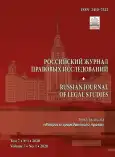Systematization and improvement legal regulation of the use of artificial intelligence in law enforcement
- Authors: Barchukov V.K.1
-
Affiliations:
- Higher School of State Audit Lomonosov Moscow State University
- Issue: Vol 7, No 1 (2020)
- Pages: 106-112
- Section: Criminal Process and Law enforsment
- Submitted: 07.07.2020
- Accepted: 08.07.2020
- Published: 07.08.2020
- URL: https://journals.eco-vector.com/2410-7522/article/view/34958
- DOI: https://doi.org/10.17816/RJLS34958
- ID: 34958
Cite item
Abstract
The article systematizes legal acts at the international, Federal and departmental levels on the use of artificial intelligence in law enforcement.
In particular, at the international level, the corresponding legal act, according to the author, should contain three components of legal regulation: 1) regulate the organization and construction of an artificial intelligence system between States; 2) determine the principles of functioning of artificial intelligence; 3) regulate the ethical issues of using artificial intelligence.
The legal basis for the use of artificial intelligence systems in law enforcement at the Federal level, in addition to the Constitution of the Russian Federation, should be the Strategy for the development of the information society in the Russian Federation (Strategy) for 2017-2030, as well as some special Federal laws (for example, the Law of Moscow), which are designed to specify the mechanism for using the advantages of artificial intelligence in all spheres of public life, including law enforcement.
The author notes that the mentioned strategy defines only the General provisions of the state policy on the development of information technologies and artificial intelligence technologies. At the same time, the implementation of national interests outlined in the Strategy is impossible without the effective work of law enforcement agencies, whose functioning, in turn, is impossible without a well-built system of interaction between information support and artificial intelligence.
The final part of the paper presents some proposals for improving the legal regulation of the use of artificial intelligence in law enforcement, in particular, justifies the need to adopt a national Doctrine for the use of a Unified system of information support and artificial intelligence in the activities of law enforcement agencies.
Full Text
About the authors
Vadim K. Barchukov
Higher School of State Audit Lomonosov Moscow State University
Author for correspondence.
Email: barchukov-vk@mail.ru
aspirant
References
- Andreeva O.I., Ivanov V.V., Nesterov A.Yu., Trubnikova T.V. Face recognition Technologies in criminal proceedings: the problem of legal regulation of the use of artificial intelligence. Bulletin of Tomsk state University. 2019;(449):206. (In Russ.).
- Egorov V.A. Use of information technologies in law enforcement: Organizational and legal problems. Saratov: Publishing house of the Saratov state Academy of law, 2006, P. 5. (In Russ.).
- Pichugin D.A. Kryptonite. Russian journal of legal research. 2017;4(3):151-157. (In Russ.).
- Kashkin S.Yu. Artificial intelligence and robotics: the possibility of invasion of human rights and legal regulation of these processes in the EU and the world. Lex Russica. 2019;7(152):155. (In Russ.).
Supplementary files







